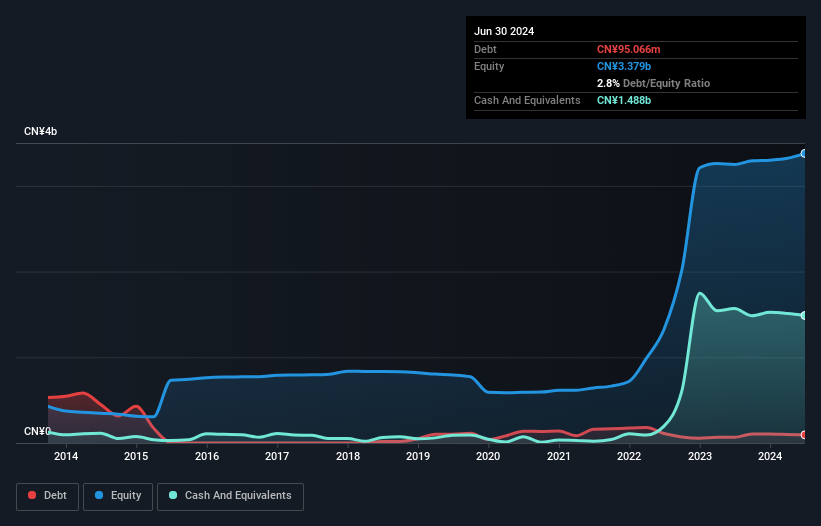
Some say volatility, rather than debt, is the best way to think about risk as an investor, but Warren Buffett famously said that 'Volatility is far from synonymous with risk.' So it seems the smart money knows that debt - which is usually involved in bankruptcies - is a very important factor, when you assess how risky a company is. Importantly, YOUNGY Co., Ltd. (SZSE:002192) does carry debt. But the real question is whether this debt is making the company risky.
Why Does Debt Bring Risk?
Debt assists a business until the business has trouble paying it off, either with new capital or with free cash flow. Part and parcel of capitalism is the process of 'creative destruction' where failed businesses are mercilessly liquidated by their bankers. While that is not too common, we often do see indebted companies permanently diluting shareholders because lenders force them to raise capital at a distressed price. By replacing dilution, though, debt can be an extremely good tool for businesses that need capital to invest in growth at high rates of return. When we think about a company's use of debt, we first look at cash and debt together.
View our latest analysis for YOUNGY
What Is YOUNGY's Debt?
As you can see below, at the end of June 2024, YOUNGY had CN¥95.1m of debt, up from CN¥66.0m a year ago. Click the image for more detail. However, it does have CN¥1.49b in cash offsetting this, leading to net cash of CN¥1.39b.

How Strong Is YOUNGY's Balance Sheet?
We can see from the most recent balance sheet that YOUNGY had liabilities of CN¥630.9m falling due within a year, and liabilities of CN¥317.8m due beyond that. Offsetting this, it had CN¥1.49b in cash and CN¥192.3m in receivables that were due within 12 months. So it can boast CN¥731.1m more liquid assets than total liabilities.
This short term liquidity is a sign that YOUNGY could probably pay off its debt with ease, as its balance sheet is far from stretched. Simply put, the fact that YOUNGY has more cash than debt is arguably a good indication that it can manage its debt safely.
It is just as well that YOUNGY's load is not too heavy, because its EBIT was down 89% over the last year. When it comes to paying off debt, falling earnings are no more useful than sugary sodas are for your health. There's no doubt that we learn most about debt from the balance sheet. But it is YOUNGY's earnings that will influence how the balance sheet holds up in the future. So when considering debt, it's definitely worth looking at the earnings trend. Click here for an interactive snapshot.
Finally, a business needs free cash flow to pay off debt; accounting profits just don't cut it. YOUNGY may have net cash on the balance sheet, but it is still interesting to look at how well the business converts its earnings before interest and tax (EBIT) to free cash flow, because that will influence both its need for, and its capacity to manage debt. Over the most recent three years, YOUNGY recorded free cash flow worth 71% of its EBIT, which is around normal, given free cash flow excludes interest and tax. This free cash flow puts the company in a good position to pay down debt, when appropriate.
Summing Up
While we empathize with investors who find debt concerning, you should keep in mind that YOUNGY has net cash of CN¥1.39b, as well as more liquid assets than liabilities. The cherry on top was that in converted 71% of that EBIT to free cash flow, bringing in -CN¥60m. So we don't have any problem with YOUNGY's use of debt. There's no doubt that we learn most about debt from the balance sheet. However, not all investment risk resides within the balance sheet - far from it. Be aware that YOUNGY is showing 3 warning signs in our investment analysis , you should know about...
If you're interested in investing in businesses that can grow profits without the burden of debt, then check out this free list of growing businesses that have net cash on the balance sheet.
New: Manage All Your Stock Portfolios in One Place
We've created the ultimate portfolio companion for stock investors, and it's free.
• Connect an unlimited number of Portfolios and see your total in one currency
• Be alerted to new Warning Signs or Risks via email or mobile
• Track the Fair Value of your stocks
Have feedback on this article? Concerned about the content? Get in touch with us directly. Alternatively, email editorial-team (at) simplywallst.com.
This article by Simply Wall St is general in nature. We provide commentary based on historical data and analyst forecasts only using an unbiased methodology and our articles are not intended to be financial advice. It does not constitute a recommendation to buy or sell any stock, and does not take account of your objectives, or your financial situation. We aim to bring you long-term focused analysis driven by fundamental data. Note that our analysis may not factor in the latest price-sensitive company announcements or qualitative material. Simply Wall St has no position in any stocks mentioned.
About SZSE:002192
Flawless balance sheet with acceptable track record.
Similar Companies
Market Insights
Community Narratives



